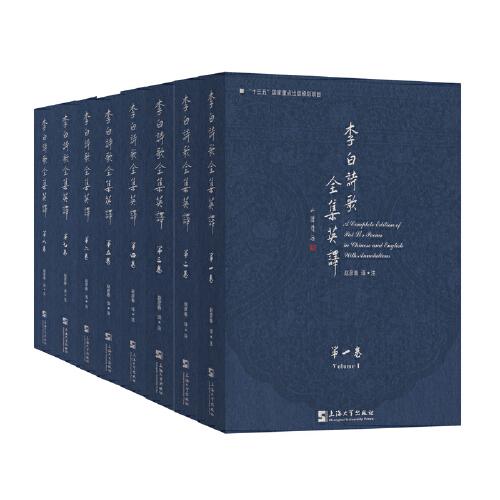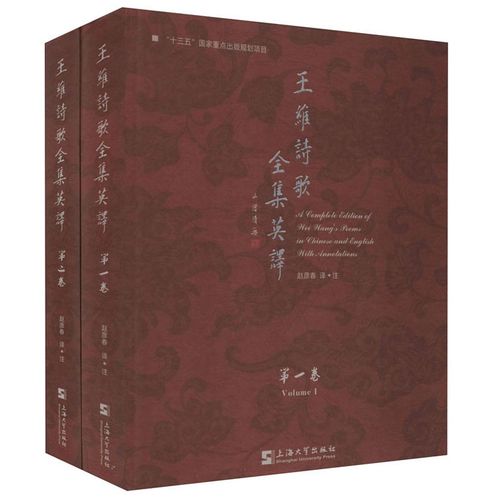
Zhao Yanchun, a professor of translation at Shanghai University, has published collections of English translations of poems by four renowned Tang Dynasty (618-907) poets, Li Bai, Du Fu, Wang Wei and Bai Juyi. [Photo provided to China Daily]
The English translations of poems by four renowned Tang Dynasty (618-907) poets have recently been published, allowing these literary masterpieces to be appreciated in lands beyond China.
The works of poets Li Bai, Du Fu, Wang Wei and Bai Juyi were translated by Zhao Yanchun, an esteemed professor of translation at Shanghai University, and have been published under the Shanghai University Press.
To date, Zhao has translated 1,052 poems by Li, more than 1,500 poems by Du, and 400 poems by Wang. Translations of Bai's 3,000 poems are still a work in progress.
Zhao says Wang's poems were renowned for his descriptions of nature and landscapes, while Li masterfully inserted his sentiments into romantic and unrestrained poetic lines. Du, on the other hand, was known for his poetry that delved into his worries about the nation and wars, while Bai often expressed concerns of his friends and homeland in his works.
Zhao, who is also president of the International Sinological Studies and Education Association, says that China boasts a long history of poetry that goes back to the age of the legendary Yellow Emperor, or Huangdi, dating back to around 2600 BC. "The Tang Dynasty is the golden age in Chinese literature, and poems by the four poets are like the jewels on the crown of Tang poetry," says Zhao.
"The language has changed little and remains easy for modern Chinese people to read. The themes are still relevant today too, ranging from friendship to love and scenery. I wish the translated poetry will spread knowledge of traditional Chinese culture to more foreign readers."

The volumes of Tang Dynasty poet Li Bai is one of two of Zhao Yanchun's complete editions of poems in Chinese and English. [Photo provided to China Daily]
Pursuit of excellence
Translating poetry is unlike regular translation work as Zhao says it requires one to be proficient in the ancient Chinese language and English, skilled in translation theories, and have well-versed knowledge of literature styles.
"Translation in other fields usually deals with content that only deliver information, but literary translation-especially poetry translation-must show readers the beauty and artistic values of words. This is the trickiest part," he says.
Zhao adds that a good translation of a poem should have rhythm and words that compel readers to form images in their minds.
"Many people regard poetry translation as something that is impossible to accomplish. But it is possible, you just need to put in a lot of effort," he says, referring to how he spent at least 14 hours a day translating Li's poems.
His quest to producing high-quality translations also involves not referring to other translations of the same work. Zhao explains that this self-imposed rule prevents him from subconsciously following the ideas and styles of others.
"What I do is read an analysis-not the translation-of the original work to gain a better understanding," he says.
Annotation is another key step in the translation process. Zhao took three months just to do annotations for Li's poems.
"There are only two words in English that refer to the moon, but there are about 200 phrases that can mean the same thing in Chinese. Each phrase has a story behind it which demands an annotation to explain ancient culture," he explains.
Besides words, the form and rhyme must also be translated appropriately.
"A translator is like god looking down at the original text and translated language, and finding a bridge between them. This process must be backed up by solid knowledge in interdisciplinary fields such as linguistics," he says. "Otherwise, the translated text will lose the charm that was present in the original."
Zhao wrote about this process in detail in his 2005 book A Reductionist Approach to Translatology. Throughout his career, he has translated and published over 20 traditional Chinese literature works, including The Book of Songs, comprising some 300 poems dating back to 7 BC; Tao Te Ching, a Chinese Taoist philosophical classic; and The Analects, a collection of sayings attributed to Confucius and his disciples.
Despite having translated thousands of works, Zhao still sees every poem as a new challenge.
"Every poem is like a code that cannot be copied. My experience has armed me with aesthetic knowledge and language abilities that allow me to do translation more efficiently," says Zhao, who took just three months to complete the translations of Li's poems.
Most translators would require years to accomplish this same feat.
"That being said, choosing the right words is always a challenge and requires a lot of research. But once I crack the code, the gratification I get is uplifting," he says.

The volumes of Tang Dynasty poet Wang Wei is one of two of Zhao Yanchun's complete editions of poems in Chinese and English. [Photo provided to China Daily]
Stellar reviews
For his professionalism and passion, Zhao received praise from local linguistics experts for his work. Zhao currently leads a team of 12 teachers and postgraduates to do research on Chinese literature at the university.
In the foreword for Zhao's translation of Du Fu's poems published in November, Jiang Xiaohua, a professor in translation at the Macao Polytechnic Institute, commends Zhao for his skillful handling of the poems' essence.
Wang Ying, a researcher from the Chinese Academy of Social Sciences' Institute of Literature, also compliments Zhao for his work on Wang Wei's poems, saying that he translated the original text in such a way that "a Western reader without background knowledge can comprehend the beauty and most idyllic pictures showcased in poems".
"Being able to depict an image through a poem is really a characteristic style of his. The poem demonstrates the poet's experience in an ideal spiritual realm. Zhao also explicitly reveals the logic of the sentences and supplements the poetic conception and milieu with the right words," Wang Ying says.
"Rhyme and meter are what Zhao stresses most in his translations, and this perfectly retains the poem's original meaning, form, rhyme and artistic conception."

